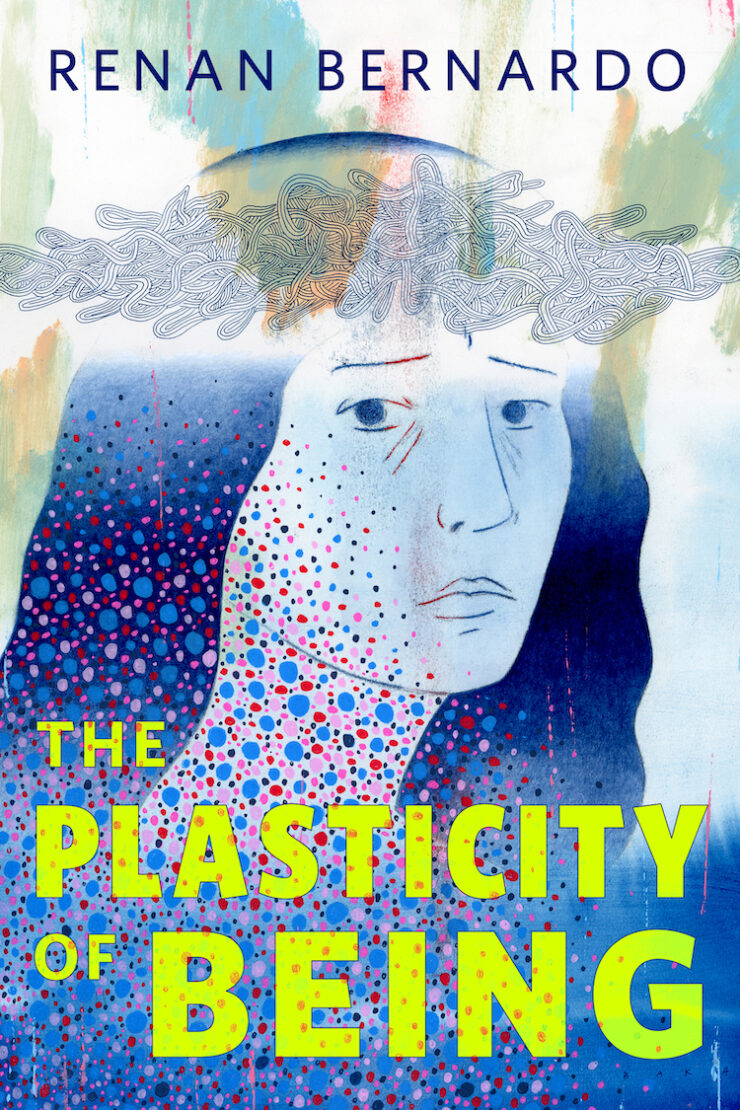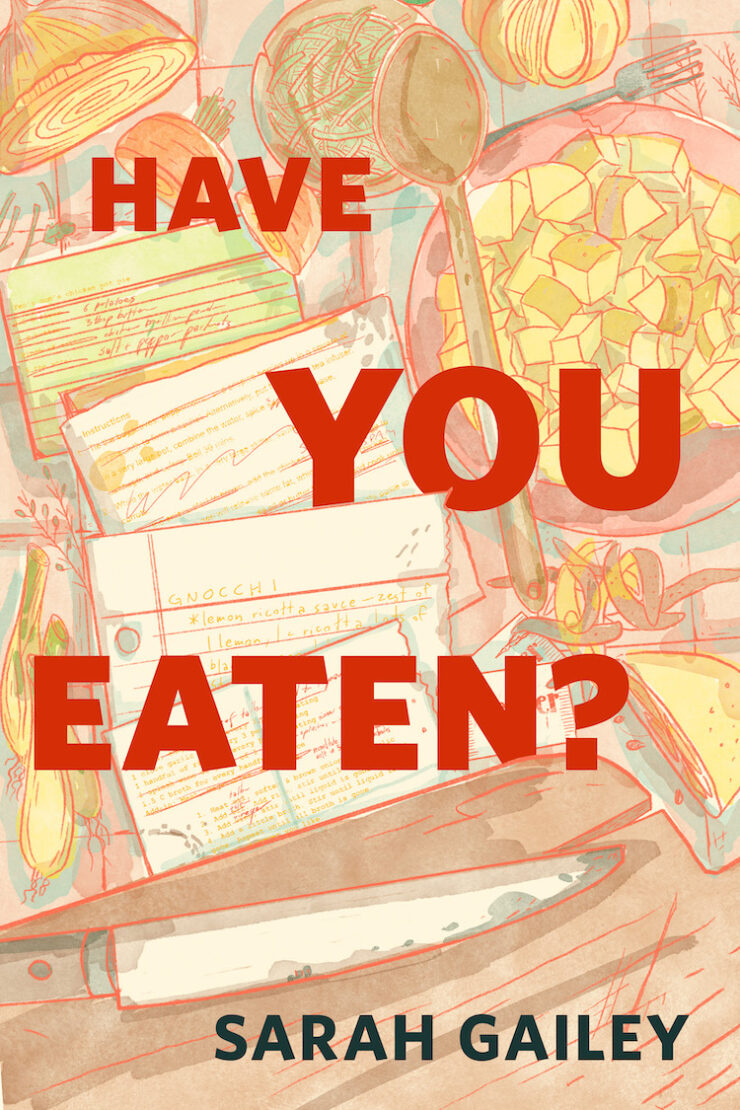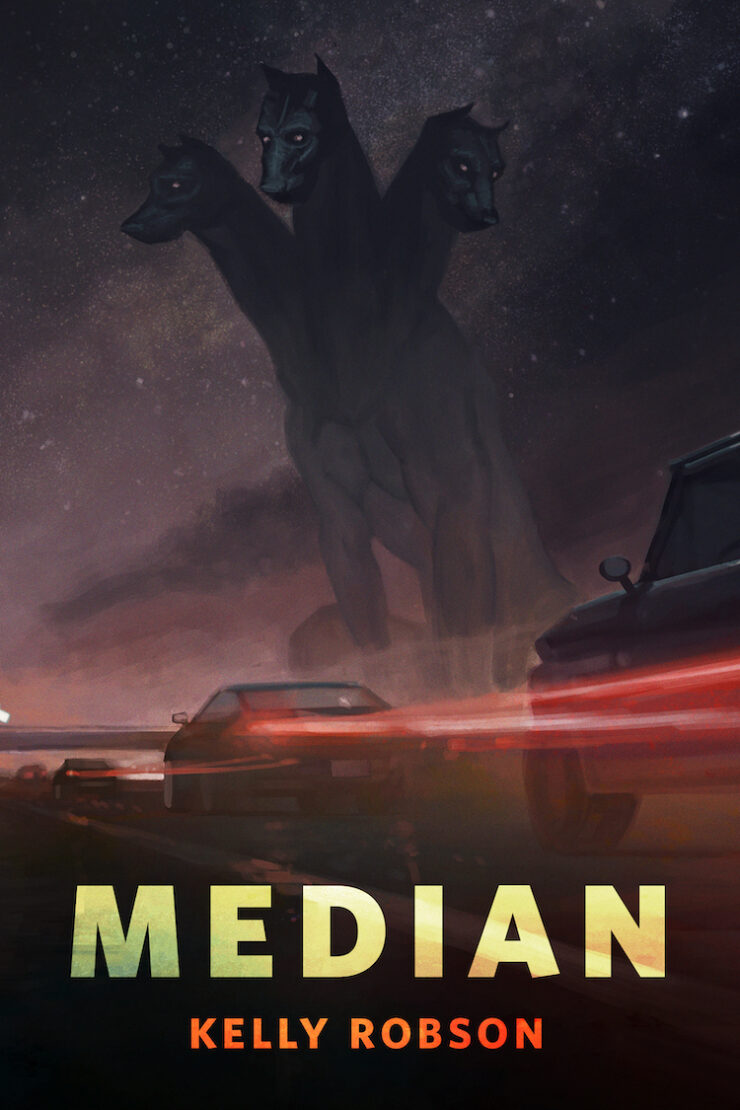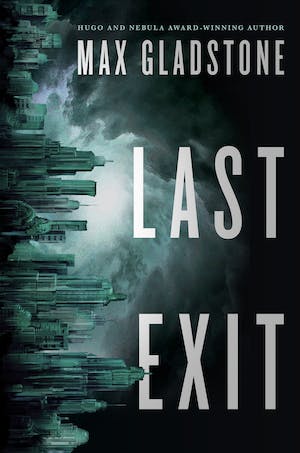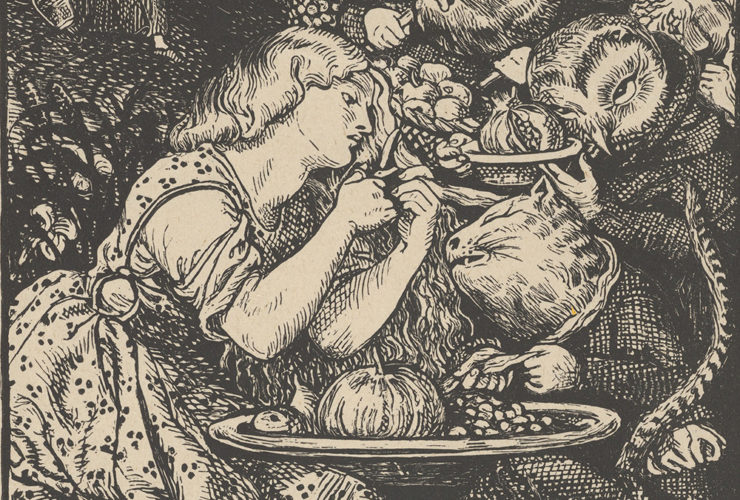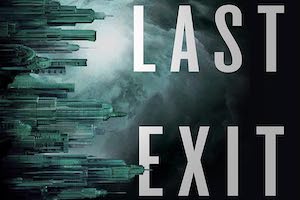Welcome back to Reading the Weird, in which we get girl cooties all over weird fiction, cosmic horror, and Lovecraftiana—from its historical roots through its most recent branches.
This week, we continue Max Gladstone’s Last Exit with Chapters 5-6. The novel was first published in 2022. Spoilers ahead!
Summary
“That’s what you feel. The storm against the wall of the world.”
Zelda and June are en route to Philadelphia by train. June accuses Zelda of “wrongheaded, individualistic horseshit” for thinking she’s to blame for Sal’s disappearance, and for trying to fix it solo. Zelda is moved to hug the girl; after a moment’s surprise, June hugs back with desperate tightness.
In Philly, June reveals she’s never been out of New York, and wants to see the Liberty Bell. They retrieve Zelda’s Subaru; Zelda assures her it drives better than it looks. And why should it look shiny after years on the road and the occasional dinosaur encounter?
Sal always insisted on visiting the Liberty Bell too. Zelda thinks the bell’s like America: Both needed to be recast multiple times before they rang well, and then they cracked. But they’re still here. June takes a pic of Zelda and the bell, which reminds Zelda that June needs to dump her cell phone. To gather spin, she’ll need to avoid surveillance systems tracking (and enforcing) her exact location. June balks.
Behind her, insect-jointed, claw-tipped arms unfold from the crack. Of the tourists, only one young boy notices. Zelda shoves June aside and dives into the alien grasp. She plunges a hand into the bell. Her fingers close on something solid, and she struggles to pull it free as whispers, and the bell peels. The beetle-wound in her wrist reopens. She hears Sal’s voice: Just a little further. Shadows pull her inward. Human arms pull her back, June’s.
People didn’t witness her battle, but everyone heard the bell—and sees that the bell-crack’s been filled with something like glass, shimmering with color. The thing Zelda pulled from the crack is an iron ring, sized to her finger. She should throw it away. She can’t. She and June take off before authorities arrive.
In a Walmart parking lot, along with other motorized nomads, the two stop for the night. Earlier Zelda rebandaged her wrist at a rest stop. A woman, noticing her wound, offered the address to a women’s shelter, so yeah, Zelda looks that beat-up. Over Rice-A-Roni, she tries to explain her plans. First she has to contact her old road-mates. They’ll respond now, because they too must know something’s wrong. Even June has felt it, Sal’s “hurricane’s weight” of spin beating against the world’s wall. And maybe they feel guilty about how Zelda has spent ten years fighting alone.
June agrees to lose her phone, to write down any numbers she might need. Zelda writes to Sarah, Ramon and Ish, the same few lines to each: “She’s coming back. I need your help. Let’s meet where we split up. Love, Zelda.” She looks up into the night sky and sees “dark fractal clouds. The tornado road. Sal’s face peering in.” Her breath comes fast, her blood rushes, her wound burns—she’s getting sick, though there’s no time for that, Sal’s on her way, the others need her. But still she collapses at June’s feet.
* * *
Ish Colby knows that “a serpent gnaws at the root of the world.” Continent-vast, it rages with the hatred for humanity it has accumulated in its “many-mansioned” heart. One day all will fall into its jaws. Ish once believed that if he escaped his childhood misery, the serpent wouldn’t follow. At college, he met Zelda, and with her and their friends, he went on a grand adventure, only to find—the serpent.
People suppress their subconscious dread of the serpent in many ways: sex, drugs, rock and roll, power games. Ish builds systems for himself: rigid daily routines, an invariable wardrobe. Simplify, that’s what he preaches to his employees. He’s the founder and chief executive of a San Francisco-based tech company called Lidskjalf, after the throne from which Odin oversaw the world, and he’s refused to take the company public. Like his true clients, he knows the need for close surveillance, as through “the camera eyes of four hundred million phones… through the ears of fifty million person digital assistants… apex military technology turned consumer staple.” Unlike them, he understands the serpent, watches for “the moments when the world lurched” so he can stop them.
Zelda was the one he’d loved. Since her, he’s developed a system to control his emotions. Sex is much simpler than love. He chooses other people who need to preserve their time and energy for more important things, who can agree to ending their well-paid arrangements after a year, no clinging. Cynthia is his current partner. She’s waiting for him the evening, after he wakes from a dream of teeth and tornado roads and a face hidden in the sky. They start a pleasant power-game interrupted when he notices Zelda’s newly-arrived letter and recognizes the handwriting.
After overcoming his shock, he reads Zelda’s note. He wishes he could tell Cynthia the truth about the college friends he “owes.” Instead he asks her to be there when he returns, sleeps with her with his wrists in the cuffs attached to his bed, and is gone in the morning when she wakes.
This Week’s Metrics
A Universe Full of Teeth: Zelda, sick, imagines herself swimming through the deep waters where “only monsters lived, unseen long sharp things that you knew existed only from the tooth marks they left on the whales they did not kill.” Maybe monsters like Ish’s serpent gnawing at the roots of the world with “acid fangs”.
The Degenerate Dutch: Ish’s clients would rather use his surveillance products to track water protectors and “everyone who ever shook hands with Greta Thunberg” than to “stop racist idiots with guns from shooting up schools or garlic festivals.”
Libronomicon: This week is full of media references: to “See-Line Woman,” to Star Trek: Deep Space Nine and Star Wars, to the Norse Eddas.
Ruthanna’s Commentary
After reading a couple chapters of Last Exit, you might feel pretty cynical about the state of the world. Literature is not always reality and hope is a discipline; please take a moment to catch up on the more nuanced progress of world-saving. Honestly I might replace my tooth-tracking metric with a biweekly dose of reassurance that the tornado road is not quite so imminent as it sometimes feels.
And it surely can feel imminent, and sometimes you need a powerful depiction of what it’s like to live in that narrow place of intersecting apocalypses. This week we get a suggestion that Zelda’s moments of hope can be just as mythic as her hopelessness: Healing the crack in the Liberty Bell is not exactly a subtle metaphor. But we also get our first glimpse at how another member of her old gang handles their failure. Ish, too, sees Zelda as a larger-than-life figure. He also sees their failure in mythic terms: There is a serpent gnawing at the roots of the world, too vast and implacable to fight successfully. After all, Zelda couldn’t do it. So he builds his life and emotions in the service of holding that serpent off for just a little longer. And holding off the big emotions that of course Zelda is the only person big enough to deserve.
For anyone who hasn’t seen Zelda pull claw-monsters out of national icons, Ish might seem more mythical. The genius world-changing tech CEO—using unethical clients for secretly ethical purposes, yet—is one of our strongest modern legends. Perfect self-control, total awareness of looming crises, handwavey ability to turn big data into actionable knowledge, occasional willingness to play the fantasy sugar daddy, maybe secretly Batman. (Ruthanna, are you a little cynical about machine learning, big surveillance, and the brilliance of techbros? Possibly. And I suspect Gladstone of deliberately taking on a wide range of heroic tropes.)
What impresses me most about this week’s chapters, though, is the way Zelda’s and Ish’s shared assumptions—that the world is inevitably ending, that we live in the best possible reality, that Zelda is iconic in both success and failure—combine to provide the first hints that those assumptions are wrong. June has no patience for Zelda’s “wrongheaded, individualist horseshit,” and her stubbornness forces Zelda to accept her presence (and maybe the possibility of hope). Ish creates rigid systems to control his emotions, and yet manages real feelings for his current transactional lover anyway. Zelda has reason to distrust strangers, even humanity as a whole, yet meets a stranger who wants to rescue her. Zelda takes down her first piece of Rot with June there, and hears the Liberty Bell ring: “high, deep, angelic, and clear… from a world she’d never seen, could barely imagine. A world worthy of redemption.” In other words, the better world that the old gang never found. Or this world, better than Zelda or June or Ish give it credit for.
June’s the one who demanded they visit the Bell, too. She has… call it a sense of direction. A way of getting to where she wants or needs to be, whether that’s June’s train or the crack through which the light gets in.
The bell is a metaphor, or a set of metaphors tangled together. Sal thought so, gave different explanations for how it was a “good reminder” at every visit. It’s cracked, healed, ringing, still here in spite of everything. And in the crack of the ringing bell, in the middle of the Rot, is… a ring. Zelda hasn’t told us readers its meaning, but one can guess. Maybe a gift from Zelda to Sal, or maybe something Zelda refused from Sal’s hand. Iron’s not the usual metal for lovers’ rings. It’s not precious like silver, not imperishable like gold or platinum. It’s relatively easy to forge yourself, solid and old, changing with exposure to the elements. Traditionally it’s inimical to magic.
One suspects that, like the bell, it carries another set of tangled metaphors.
Anne’s Commentary
Besides the butt cleavage Dan Akroyd displayed in SNL’s classic Refrigerator Repair Man skit, the most famous crack in American history must be the Liberty Bell’s. Of all the attractions in Philadelphia, June wants to see the bell. Does she know Sal always insisted on visiting that site? Probably not. What’s important is that Zelda remembers Sal calling the crack a “good reminder,” but of what? Sal has a different answer every time Zelda asks. Zelda’s settled on the bell as an overarching metaphor for the United States, both having needed much recasting to work right, both having ended up cracked, both still here. Though flawed, the bell and country are worth preserving.
To preserve the human world was the road-riders’ prime directive. It remains Zelda’s. The best she’s been able to do is to mend the cracks in that world’s defenses, but she must persevere; as she confesses to June, the road-riders took so much spin to the crossroads that when they “slipped,” failed, its power escaped their control and “cracked everything,” “hairlines” here, “huge gaps” there. It’s no surprise that Sal and the Enemy, or the-Enemy-as-Sal, can’t resist bursting through her favorite “reminder” to make another grab for June—and for Zelda, her/its ultimate target.
I wonder if June could save Zelda because Enemy-Sal was willing to let her go, so long as she took the bait planted inside the bell, that iron ring sized for Zelda’s finger. Why does retrieving it devastate Zelda? Why can’t she throw it away? In the relative safety of the Walmart parking lot, she tells June that if Sal were still here and asked her to abandon the road for some retreat in which they could watch the world’s end hand in hand, Zelda would let the world go.
It’s a lie, at least, that Zelda never had that choice. Sal had “offered [Zelda] everything [she’d] never dared to ask,” and Zelda had run scared. She hadn’t taken Sal’s ring, presumably a proposal of marriage. The crossroads in sight and Sal bleeding in their interdimensional vehicle, Zelda left the ring in Sal’s hand and ran.
Now she has the ring again, a renewed proposal, and Sal manifests in the night sky as if awaiting an answer. It’s more than Zelda can stand, sickening as she is (from beetle-bite envenomation?) She’s managed to write her summoning letters, but they slip away as she passes out.
Are the letters lost? The next chapter answers that question. First, however, it provides one of the introductions I’ve been itching for. Not that I haven’t enjoyed Zelda’s musings and the by-play between her and June, but conversations about fossil fuel-based transportation and motor-nomad culture border on extraneity, as does Zelda’s restroom encounter with Cassie. Unless Cassie reappears down-plot, I’d rather be meeting Zelda’s college buddies.
Zelda’s indisposal at the end of Chapter Five indeed signaled a point of view switch. Is it a point against Gladstone that the reader goes several pages before learning the serpent dissertation doesn’t come from Zelda’s fever-addled mind? I say no. The further I got into the extended metaphor, the myth made to account for a threat perceived gut-deep, the less it “sounded” like Zelda—and the less I was surprised when another road-rider surfaced as the responsible myth-maker.
More conventionally, the chapter might have opened with Ish Colby waking from his tornado-road nightmare, then starting his highly regimented day. To segue then into a lengthy rumination on the serpent would have been a more severe brake on story progression than situating it upfront, where it functions as an effective introduction to Ish’s psyche and worldview. Intimate as the first few pages are, I don’t feel like a stranger when I land in his bedroom.
Ish is the tech-geek of Gladstone’s heroic foursome (or fivesome again, counting June.) Moreover, he’s an extremely rich tech-geek. More moreover, his specialty is the kind of deep surveillance and secret squirrel stuff that makes his workday activities classified and his government connections extensive. Money and influence are important resources for world-saviors. Add the ability to place eyes and ears globally, and you couldn’t ask for more from your IT guy. Unless it’s that he can double as a muscle guy, too, following his obsessive fitness program.
That he used to be in love with Zelda (maybe isn’t altogether over her) is history that could cut both ways. For now, it and his connection to the other road-riders have him rushing to answer Zelda’s summons. Ish may have “systematized” his life as psychic defense against the world-gnawing serpent, he may try to contractually keep love out of his sex life, but he hasn’t shriveled his heart beyond reach, as even his relationship with Cynthia betrays.
So, no worries, those summons letters didn’t blow across the parking lot to accumulate in chain-link corners with other trash and rustle purpose-unfulfilled to the world’s end. June must have posted them for Zelda, after all.
Next comes Ramon. Last we saw, his Challenger was perilously close to the crossroads. Does he still own it, or must the road-riders find a new dimension-hopping vehicle?
Next week, K.J. Bishop’s “Saving the Gleeful Horse” offers bridge trolls and brightly colored animals and a slantwise perspective on both. You can find it in Ann and Jeff VanderMeer’s The Weird.


